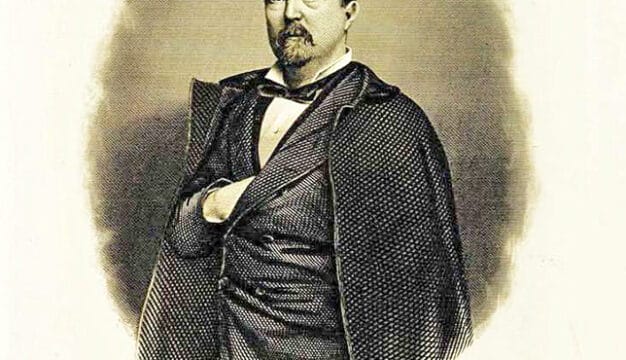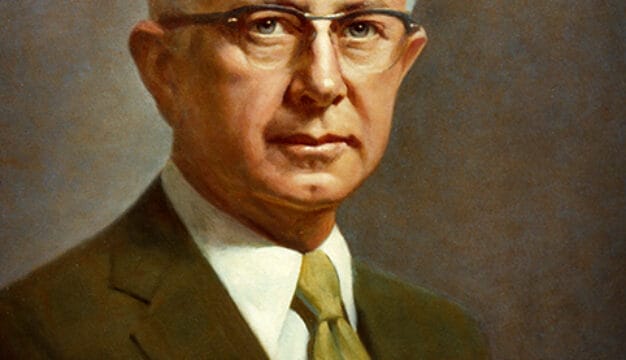Fannie Motley
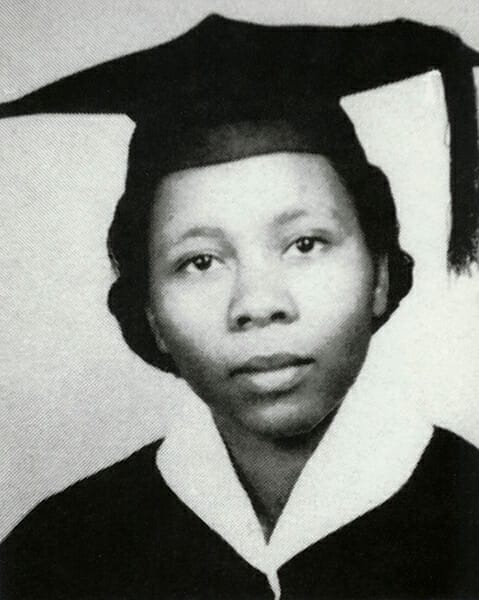 Fannie Smith Motley
Fannie Smith Motley (1927-2016) was the first African American to graduate from a previously all-white college in Alabama. In 1956, she graduated with honors from Spring Hill College (SHC) in Mobile. She pursued a career in education and had a scholarship named for her at Spring Hill.
Fannie Smith Motley
Fannie Smith Motley (1927-2016) was the first African American to graduate from a previously all-white college in Alabama. In 1956, she graduated with honors from Spring Hill College (SHC) in Mobile. She pursued a career in education and had a scholarship named for her at Spring Hill.
Fanny Smith was born on January 25, 1927, to Nelson H. Smith Sr., a Baptist minister, and Lillie A. Little Smith in rural Perdue Hill, outside Monroeville, where she had little interaction with whites. She attended all-black Selma University from 1944 to 1946, where she met D. L. Motley, a ministerial student. Both were contemporaries there of Autherine Lucy, who later desegregated the University of Alabama for three days in 1956. Fannie married D. L. Motley on June 1, 1949, and the subsequent birth of their two sons interrupted her college education. In 1952, D. L. accepted the pastorate of Yorktown Baptist Church in Plateau, north of Mobile, as news was spreading through the black community of SHC’s impending desegregation.
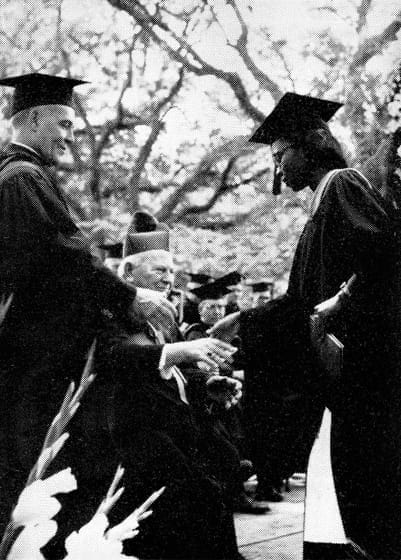 Fannie Motley Graduation
Spring Hill, Alabama’s oldest college, was founded in 1830 by Michael Portier, Catholic Bishop of Mobile. In the mid-twentieth century, it was part of a network of 26 Jesuit colleges and universities in the United States, of which only Loyola of New Orleans and Spring Hill were still segregated. SHC president W. Patrick Donnelly, S. J., and his successor, Andrew C. Smith, S. J., had initiated incremental enrollment of blacks, first to summer sessions in 1949 and then to off-campus extension courses at night in 1952. Finally, in May 1954, 10 days before the U.S. Supreme Court’s historic Brown v. Board of Education decision, the Board of Consultors—a governing body composed of five Jesuits in residence at SHC—approved unilateral desegregation of the college’s programs. Nine black students enrolled in September 1954, but Fannie Motley was not one of them.
Fannie Motley Graduation
Spring Hill, Alabama’s oldest college, was founded in 1830 by Michael Portier, Catholic Bishop of Mobile. In the mid-twentieth century, it was part of a network of 26 Jesuit colleges and universities in the United States, of which only Loyola of New Orleans and Spring Hill were still segregated. SHC president W. Patrick Donnelly, S. J., and his successor, Andrew C. Smith, S. J., had initiated incremental enrollment of blacks, first to summer sessions in 1949 and then to off-campus extension courses at night in 1952. Finally, in May 1954, 10 days before the U.S. Supreme Court’s historic Brown v. Board of Education decision, the Board of Consultors—a governing body composed of five Jesuits in residence at SHC—approved unilateral desegregation of the college’s programs. Nine black students enrolled in September 1954, but Fannie Motley was not one of them.
For Motley, inured to Jim Crow segregation, enrolling at Spring Hill was a difficult decision. Although encouraged by her husband to complete her degree, Motley balked, insisting that she should wait for an opportunity to attend the all-black Alabama State College in Montgomery. Nevertheless, Rev. Motley persisted in his efforts to convince Fannie that SHC offered her the best chance of earning her college degree. In December 1954 Fannie overcame her fear and submitted an application.
Because her coursework from Selma University was unaccredited, the academic dean, George Bergen, S.J., wanted Motley to enter as a freshman, as the other African American students had done the previous fall. At Motley’s insistence, however, Bergen agreed to transfer the credits on the condition that she maintain the same level of academic excellence at SHC. Motley agreed and enrolled in February 1955. At the end of the term, she had attained junior status and was an honors student. She took on heavy course loads of philosophy and theology each session, including the summer of 1955, as she pushed to complete her degree.
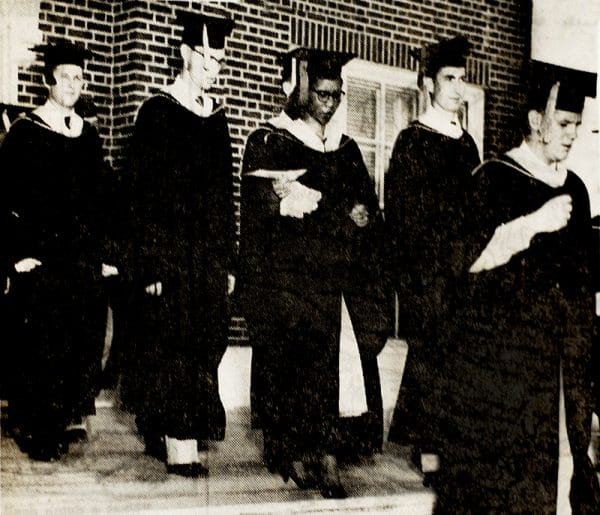 Fannie Motley Graduation
For the duration, Motley was the only African American and, frequently, the only woman in her classes. Anxiety over attending classes with whites gradually eased, and she formed warm attachments to some of her classmates and professors. Their esteem for Motley is demonstrated in an autograph book she used as her graduation neared. The annals of desegregation in the South contain no artifact quite like Motley’s autograph book, which substantiates the uniqueness of Spring Hill’s peaceful and successful embrace of desegregation.
Fannie Motley Graduation
For the duration, Motley was the only African American and, frequently, the only woman in her classes. Anxiety over attending classes with whites gradually eased, and she formed warm attachments to some of her classmates and professors. Their esteem for Motley is demonstrated in an autograph book she used as her graduation neared. The annals of desegregation in the South contain no artifact quite like Motley’s autograph book, which substantiates the uniqueness of Spring Hill’s peaceful and successful embrace of desegregation.
One of the signers, Walter Mullady of Chicago, was paired with Motley alphabetically in the graduation procession, which took place on May 29, 1956. He coaxed her to smile for the assembled photographers and quipped to Motley that he was glad to be in line next to her because his graduation photo would go out with hers on the wire services. But the graduation was a solemn occasion for Motley, who had shunned all interviews and publicity, fearing reprisals against her family from the Ku Klux Klan. Motley countered, “You won’t catch me looking at one of those reporters.” That afternoon the Mobile Press ran a photograph showing the petite Motley with eyes focused forward, head erect, and only the slightest hint of a smile. Next to her Walter Mullady looked directly into the camera and beamed broadly. The New York Times and the weeklies Time and Jet ran the image as well.
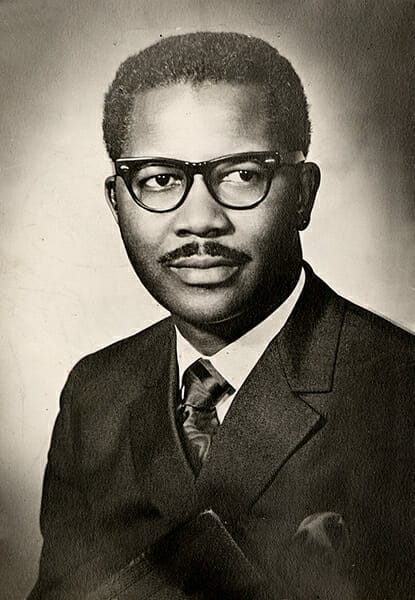 Nelson Smith
No reprisals followed her graduation, and that same year her brother Nelson Smith co-founded the Alabama Christian Movement for Human Rights with Fred Shuttlesworth in Birmingham. Like all the other women in her family, Motley pursued a career in teaching, first in Mobile and then Cincinnati, where D. L. accepted a pastorate in 1962. On May 9, 2004, Spring Hill conferred on Motley an honorary doctorate of humanities. The college also established the Fannie Motley Endowed Scholarship to further diversity on its campus. Motley died in Fairburn, Georgia, on May 18, 2016, and was interred at Vine Street Hill Cemetery in Cincinnati, Ohio.
Nelson Smith
No reprisals followed her graduation, and that same year her brother Nelson Smith co-founded the Alabama Christian Movement for Human Rights with Fred Shuttlesworth in Birmingham. Like all the other women in her family, Motley pursued a career in teaching, first in Mobile and then Cincinnati, where D. L. accepted a pastorate in 1962. On May 9, 2004, Spring Hill conferred on Motley an honorary doctorate of humanities. The college also established the Fannie Motley Endowed Scholarship to further diversity on its campus. Motley died in Fairburn, Georgia, on May 18, 2016, and was interred at Vine Street Hill Cemetery in Cincinnati, Ohio.
Additional Resources
Padgett, Charles Stephen. “Schooled in Invisibility: The Desegregation of Spring Hill College, Mobile, Alabama, 1948-1963.” Ph.D. diss., University of Georgia, 2000.
———. “Hidden from History, Shielded from Harm: Desegregation at Spring Hill College, 1954-1957,” Alabama Review 56 (October 2003): 278–310.
Motley’s brother, Nelson Smith, is mentioned several times in Glenn Eskew, But for Birmingham: The Local and National Movements in the Civil Rights Struggle (Chapel Hill, 1997).

